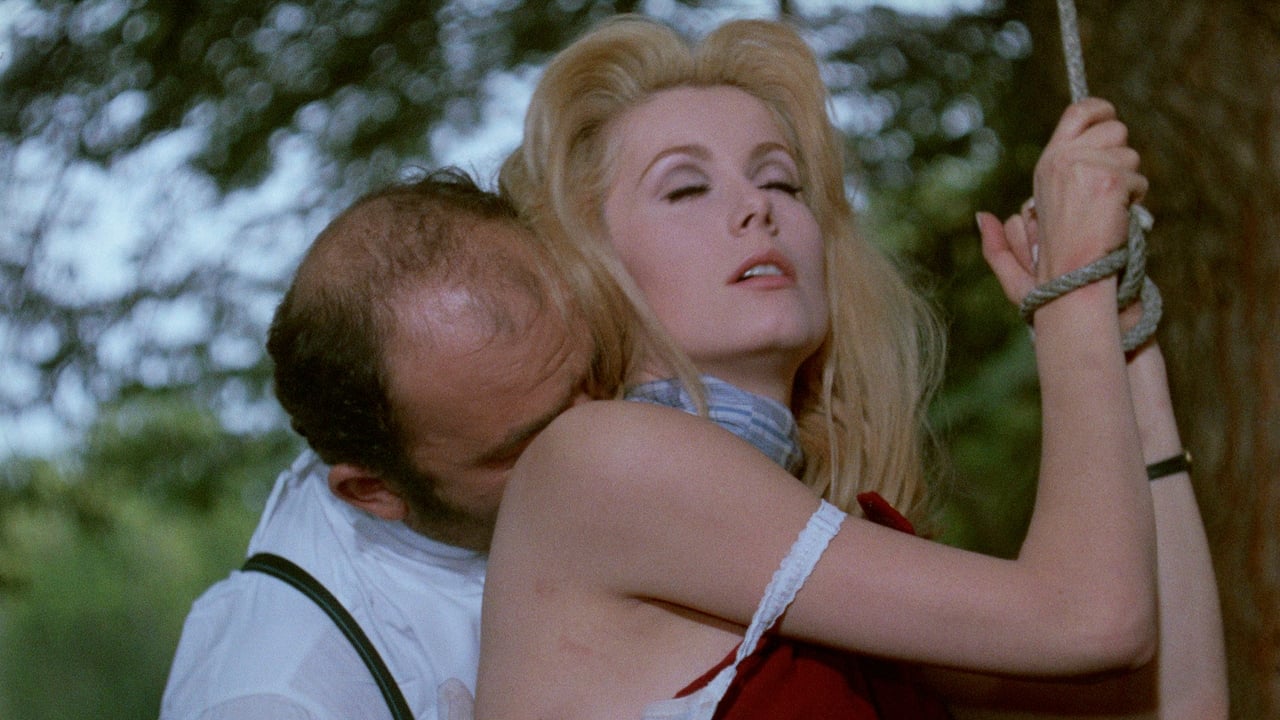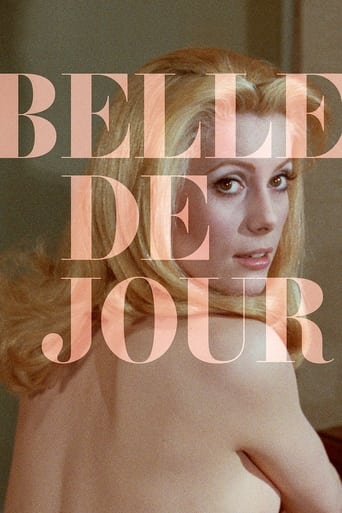

The silent era, the dawning of sound in film, the narrative complexities of Citizen Kane (1941), the rise and fall of the studio system, the Nouvelle Vogue, the novelty of the summer blockbuster and the increasing corporatism in Hollywood; auteur Luis Bunuel was around for all of that. Standing on the outside of film history, Bunuel never really considered himself a "filmmaker" but more of an artist who uses film as his means of expression. Most of his films were laden several layers deep with repeated narrative elements, incendiary attacks on social institutions, deeply personal musings and of course his trademark surrealism. Even today his films not only defy aspects of film form, but mock any notion of categorization. They're not films, they're defiant chuckles at the expense of the abyss.Belle de Jour is the rebel director's most popular film and by all outward appearances his most commercial. A rundown of the plot reads like an Adrian Lyne film; Severine (Deneuve) a young but emotionally vacant housewife spends her afternoons as a prostitute. Yet what's lost in such a description is the film's oozing sexuality and festering indignation of Catholicism and haute bourgeois living. Not a single frame of Belle de Jour is filled with nudity yet everything is given a sexual dimension from the quiet demurs of a housewife's diligent sewing to the firm coaxing of Severine's madam (Page).The film in its initial run was no doubt helped at the box office by the presence of Catherine Deneuve, whose performance in The Umbrellas of Cherbourg (1964) and followup work in The Young Girls of Rochefort (1967) have made her an international star. What brought her to Belle de Jour and Bunuel is a bit of a mystery but unlike some of Bunuel's leading ladies in other films, Deneuve is quite simply irreplaceable. She walks a razor-thin tightrope between dignity and depravity encompassing the troubling idiom "angel in the kitchen, whore in the bedroom" yet on her own terms. No doubt a lesser actress would fray to Bunuel's wearisome demands but with Deneuve it's hard to tell who's really controlling who. Keep in mind in several instances Severine fantasizes about being raped, beaten and whipped in dream sequences Deneuve had to perform. Anyone who can keep their dignity while being pelted with mud like that is certainly talented beyond most.Unlike the equally engaging Viridiana (1961) and The Exterminating Angel (1962), Belle de Jour is at once more collaborative and more personal. Personal because the film certainly indulges in naked and prurient interests of the director. Yet collaborative because he's found an actress willing to explore human perversion in a way that goes beyond sharp and blustering mockery. Bunuel and Deneuve would team up once more for Tristana (1970) becoming one of the only leading lady repeat collaborators (a list whose only other inclusion is Silvia Pinal). As a followup, Tristana is certainly angrier yet in its petulance feels less layered by comparison.Anyone intimidated by the expansive and critically irreproachable filmography of Luis Bunuel should seek Belle de Jour as an introduction. The film lies on the nexus between popular appeal, art-house, thinking-man's proclivities and the director's particular brand of madness. Furthermore, Catherine Deneuve is a game collaborator who at times steals the film to add some tasteful meta- text. Gloriously sexy, defiantly surreal and presented in luscious color for the first time in Bunuel's career, Belle de Jour is a must see for film fanatics.
... View MoreBelle de Jour (1967): Dir: Luis Bunuel / Cast: Catherine Deneuve, Jean Sorel, Genevieve Page, Michael Piccoli, Pierre Clementi: Rousing erotic masterpiece that takes the whole idea of secret lifestyles and prostitution from its common place during the night hours and places it within the midst of day. Catherine Deneuve stars as the delusional housewife of a wealthy surgeon whom she is unable to commit herself sexually. She has submissive fantasies such as being tied up or being plastered with mud. She eventually discovers a brothel where she embarks upon erotic sexual play with males of all class and race. She is reluctant yet curious. What is interesting is the world she now inhabits and the dangers that accompany it. Insightful directing by Luis Bunuel who previously directed Deneuve in Tristana. Deneuve is compelling as she descends into fantasy not realizing the dangers or consequences. Jean Sorel as her husband accepts her unwilling sexual nature yet becomes the victim of her double life. Genevieve Page plays the brothel head who makes the demands yet accepts her willingness to leave. Michael Piccoli plays a blackmailing friend of her husband's who introduced her to the brothel until having second thoughts. Pierre Clementi plays the obsessive young gangster who desires more than a kinky afternoon delight. Brilliantly crafted examination of brothels and the women who inhabit them. Score: 10 / 10
... View Morea special film. like each movie by Bunuel. same scene, same tricks, same spirit. different ingredients. and Catherine Deneuve in one of her memorable roles. a film about passion and desire. about search of happiness and clash between words. ironic, cold and out of reality's circle. and it is enough for discover an universe who has its rhythm, shadows and law. a film like a parable but that is not new fact for Bunuel. a film who seduce in strange manner because it is only a chain of questions. surrealism is basic answer but not the only. because it is an imitation of life in essential aspects. and a challenge. like each of Bunuel films.
... View MoreInteresting Buñuel piece about a woman seeking liberation by being a "woman of the day" since she is only available while her husband's at work.What follows is a series of events that takes her down a new road she might not be ready for. Deneuve is excellent in her role. Buñuel offers some classic imagery that he has been famous for.But, in the end, you wonder if there is much point beyond Deneuve's journey. And, the ending is left to interpretation. That isn't bad, and is actually the highlight of the film, since it is where the film is set free.****** (6 Out of 10 Stars)
... View More